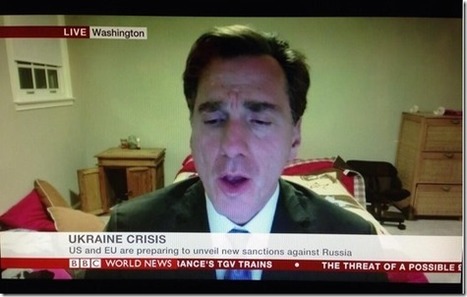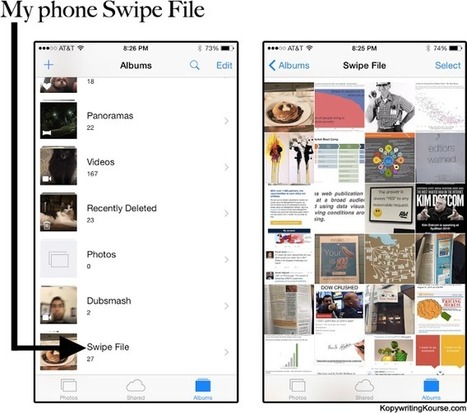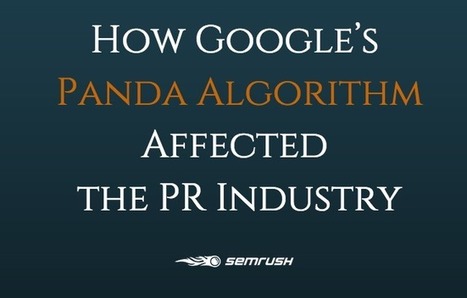 Your new post is loading...
 Your new post is loading...

|
Scooped by
Jeff Domansky
November 25, 2016 2:22 AM
|
At its core, public relations (PR) is about developing positive relationships with your key audiences, whoever you define them to be. So we wanted to provide business owners and communications practitioners with PR tips that address just that. We reached out to some of the industry’s leading public relations experts to learn their thoughts on relationship development. Below are 23 PR tips in response to our question...

|
Scooped by
Jeff Domansky
November 18, 2016 6:31 PM
|
Lee Feinstein, the former U.S. ambassador to Poland, has an impressive résumé. He served under two presidents (Clinton and Obama), worked at the Departments of Defense and State, and is a prolific author. Today, he serves as the Senior Transatlantic Fellow for the German Marshall Fund.
But when I saw this tweet on Sunday night, I knew I’d want to write about an interview he recently gave.
The tweeter, @JudgeElihu, snapped a photo from Mr. Feinstein’s television appearance, which aired on BBC World. Although I couldn’t find the video from this appearance, I did find video of another interview Feinstein conducted from the same room in March.
The room from which Mr. Feinstein conducted the interview was a mess: a nightstand door was open, a bed was directly behind him, and small, barely detectable items were perched on the dresser....

|
Scooped by
Jeff Domansky
November 3, 2016 12:00 PM
|
When trying to communicate in English with a group of people with varying levels of fluency, it’s important to be receptive and adaptable, tuning your ears into a whole range of different ways of using English, Jenkins says. “People who’ve learned other languages are good at doing that, but native speakers of English generally are monolingual and not very good at tuning in to language variation,” she says. In meetings, Anglophones tend to speed along at what they consider a normal pace, and also rush to fill gaps in conversation, according to Steggles....

|
Scooped by
Jeff Domansky
September 1, 2016 12:19 PM
|
Andreea Ayers founded LaunchGrowJoy.com in 2011 after selling a successful t-shirt business, and realised she had plenty to share in terms of selling products successfully online. Her blog focuses on her experience with ecommerce and selling online, moving into PR and teaching product entrepreneurs how to get their products featured in print media and on influential blogs. Andreea has some tried-and-true strategies for building a buzz around your blog or business through media promotion, both traditional and online. She walks the talk, with her blog being featured in more than 500 media outlets since she started five years ago. I asked her what her non-negotiables are when it comes to seeking publicity as a solo blogger or entrepreneur....

|
Scooped by
Jeff Domansky
June 6, 2016 11:16 PM
|
Apparently, there are 4.6 of you for every one of me, and yet most of the time, I can’t get a call back from a communications person to save my life.
I am a newspaper reporter who covers county government, but my paper is fairly loose with beat restrictions, so I also write about a lot of random things that interest me (recent examples: the plight of the public-health dentist, employee retention rates in law enforcement).
Writing outside of my beat requires that I spend a healthy chunk of my daily reporting life reaching out to PR pros, the vast – vast – majority of whom refuse to communicate with me.
It happens often enough that I cringe when I have to contact a rep I don’t know, because it almost always results in me sitting at my desk moaning, “But I’m a nice person!” while staring at the phone and hitting refresh on my inbox. (You may notice those two stories above do not quote a representative from a state or national agency. This is not for lack of trying.)...

|
Scooped by
Jeff Domansky
April 12, 2016 11:59 PM
|
In this post, we’re going to review 15 marketing guides that can speed up your success.
We’ll look at the finer details of each guide, ensuring that you have a clear understanding as to how you can use each one to your advantage.
By the end of this post, you’ll have a better idea of how each guide can push you down the path to reaching all of your content marketing related goals....

|
Scooped by
Jeff Domansky
December 15, 2015 11:34 PM
|
The question he feared most looked something like this:
“What would you say to one of your customers who purchased one of your older—and therefore less safe—products?”
To help the executive develop an answer, I asked whether he viewed the older products as unsafe. “Absolutely not,” he said. “Best in the marketplace. But the new ones are even safer.”
Based on his response, I immediately categorized the question as a “false frame” question, because it contained a logical-sounding but incorrect assumption. The question’s frame was wrong, meaning we’d have to create a new and more accurate one.
To do that, I advised him to quickly rebut the false frame and then immediately make a positive and confident case that looked something like this...

|
Scooped by
Jeff Domansky
August 26, 2015 4:16 AM
|
In Iowa this evening, Donald Trump’s pre-speech press conference was rudely interrupted by immigration activist and part-time journalist, Jorge Ramos. Here’s the video.
I’ve been a staunch and relentless critic of Trump’s, and my general disapproval stands. But I have to say: He got this one right. Ramos claimed that he had a “right” to ask his question. Not really, no. Ramos certainly had a “right” to wait in line with the other journalists at the event, and he might even have had a “right” to be vexed if he’d been obviously passed over. But he certainly didn’t have a right to stand up and make a scene, nor to disrupt the proceedings for everybody else.
Having a press credential in your pocket does not entitle you to behave like Code Pink. Ramos did. Ramos was evicted. Good....

|
Scooped by
Jeff Domansky
May 28, 2015 9:23 AM
|
It was unbelievable news. And reporters shouldn’t have believed it.It turns out that the Institute of Diet and Health is just a Web site with no institute attached.
Johannes Bohannon, health researcher and lead author of the study, is really John Bohannon, a science journalist. And the study, while based on real results of an actual clinical trial, wasn’t aimed at testing the health benefits of chocolate. It was aimed at testing health reporters, to see if they could distinguish a bad science story from a good one.In many cases, they couldn’t....

|
Scooped by
Jeff Domansky
April 11, 2015 1:12 AM
|
Working on a campaign outreach? To get an editor's attention, incorporate the way people think and feel.
What moves one pitch to the top of the pile? The answer can be found in psychology. Fractl collaborated with BuzzStream to apply psychological theories to the campaign outreach process. And some interesting results emerged. Below are four key takeaways to give you a more persuasive edge when you work on your next pitch....

|
Scooped by
Jeff Domansky
March 26, 2015 11:35 PM
|
Marketers and journalists have a long and not-always happy history. A marketer is always trying to make his or her story interesting and compelling enough to spark the interest of a journalist. The journalist, on the other hand, is always trying to separate the wheat from the chaff; only writing stories that have some intrinsic value, bring page views, or some other form of audience reaction. Journalists view it as an unfortunate part of their jobs that they must constantly poke holes in marketing or PR pitches in order to avoid unwanted puff pieces for individuals, products, or organizations.
This tension between the two sides has led to an energetic, and some would say outrageous, relationship between marketing and journalism. Still, marketers and PR folks know they must develop their relationships with journalists on a fairly constant basis in order to be successful at their work. If you are an online marketer who usually has the cyber door slammed in your face by journalists, here are a few things to consider:...

|
Scooped by
Jeff Domansky
March 4, 2013 11:24 PM
|
There is an ongoing conversation among communications and SEO professionals, alike, about the value of using news releases to boost your online visibility. While there are SEO benefits, publishing news releases plays numerous other marketing roles. The rules, purpose, and audience have changed. It’s time to update how we think about them, write them, and measure their results in order to get the most online visibility value from them. There are three very distinct reasons to not only write a news release, but to publish and distribute it online....

|
Scooped by
Jeff Domansky
August 8, 2012 9:15 PM
|
Lori Russo and Krista Canfield offer seven tips and tricks for leveraging LinkedIn to communicate with journalists. In a recent PR News article, we mentioned that LinkedIn has become the most-used social network by journalists—92% are on LinkedIn. As PR professionals, you are probably trying to figure out what to do with that astounding statistic, but don't worry—we're here to help. These tips, courtesy of Lori A. Russo, managing director of Stanton Communications, and Krista Canfield, senior manager, corporate communications, LinkedIn, offer advice on how to leverage this valuable communications platform and successfully find and communicate with journalists.... [Practical media relations tips worth noting - JD]
|

|
Scooped by
Jeff Domansky
November 25, 2016 12:48 AM
|
Words are hard. Whether you're a published author or just getting started with blogging, it's not always easy to string words together in a way that makes sense, sounds good, and makes the reader feel something. But every marketer should be able to write -- and, more importantly, every marketer can write. It's just a matter of finding the writing environment that works best for you, expanding your vocabulary, asking for feedback (and listening to it), and practicing. Luckily, there are a slew of great tools you can use to help improve your writing. Check out the list below, and feel free to add the most helpful ones you use in the comment section....

|
Scooped by
Jeff Domansky
November 18, 2016 4:21 PM
|
In a reply to a publicist who contacted me recently on some subject or another, I surprised even myself when I wrote to her that I could not take up her pitch because she used the phrase “reaching out” in her email.
If memory serves, I actually went so far as to tell her it is my policy to say no to pitches in which the phrase “reaching out” or any of its variants is applied. It was a ridiculous, ornery reply to a well-meaning request for coverage, for which I apologize.
However, the “reaching out” phrase rankled me, and I am trying to figure out why. One reason is its overuse. This phrase -- “reaching out,” “reach out,” “reached out” or whatever form it takes -- is certainly overused in the p.r. biz today (and in many other places too)....

|
Scooped by
Jeff Domansky
October 24, 2016 11:06 PM
|
You’ve just delivered the perfect media response. Your answer is on message and perfectly quotable. It will accomplish everything you had hoped.
Then…you say more.
It pains me to see an answer that was brilliant in its first 15 seconds become diluted when it lasts for another minute. An extended answer also risks introducing secondary and tertiary points that offer reporters the ability to quote something relatively unimportant. And sometimes, those unnecessarily long answers lead to a “seven-second stray,” an off-message line that becomes your only quote from the interview.
When I see our trainees deliver a great answer—and then keep going—I tell them this: “When you score a touchdown, get off the field!”...

|
Scooped by
Jeff Domansky
July 25, 2016 9:11 AM
|
The prevailing wisdom in PR has been that you should keep hammering away at the key messages you're trying to get across in a media interview, no matter what.Is the reporter asking you a completely unrelated question? Doesn't matter—repeat your key message. Do they want to speak to you about an issue or topic your key messages don't even cover? Doesn't matter—repeat your key message.Is the interview a fairly relaxed conversation about your company's strategy, rather than a reputation-destroying crisis? One size fits all—just repeat your key message.If you do this enough, this line of PR thinking goes, your points will stick and the reporter will repeat them. The industry even gave this approach a name of its very own: "block (the reporter's actual question) and bridge (to your key message)." Great—except it rarely works....

|
Scooped by
Jeff Domansky
June 4, 2016 3:47 PM
|
We suppose it is possible for the Department of State to screw up the handling of questions about whether they lied to reporters even worse — but it is hard to figure out how. The video below from CNN’s Jake Tapper today nicely lays out the series of offenses — but here is our quick summary: In February 2013 Fox News correspondent James Rosen asked then State Department spokeswoman Victoria Nuland if there had been direct talks between the U.S. and Iran. She essentially said “NO.” In December 2013, Rosen points out to Nuland’s successor Jen Psaki that the correct answer would have been “YES” and asked if State routinely lied to reporters when they found it convenient. Psaki with a smirk said there are times when diplomacy needs privacy to succeed. (Translation: yes, we lied)....

|
Scooped by
Jeff Domansky
January 28, 2016 7:14 PM
|
Some people give me a hard time about how long my blog posts are (you know who you are). They tell me I should break my posts into smaller posts, or suggest I consider a 500-word post for a change. I deserve the razzing, particularly when I publish a couple of 3,000-word posts back-to-back.
In the absence of column inch or word limit restrictions, I’ll use as many words as I need to get my point across. It’s not that I don’t know how to write short posts, it’s just not my preferred style. If I’m limited to 140 characters (for now at least), I’ll use 140 characters. If I decide to write a 500-word post about how to write shorter blog posts, I can do it.
To prove my point, you’re actually reading that 500-word post I mentioned. Here are six of the most-helpful tips I’ve come across for writing shorter blog posts...

|
Scooped by
Jeff Domansky
November 23, 2015 7:39 PM
|
Previously available only in France, Babbler already boasts “300 customers worldwide and 5,000 reporters that use it everyday” in that country.
On Tuesday, the organization announced that it’s available to PR pros and reporters in the United States.
Here’s the selling point for the network, said via press release:
Babbler helps create, manage and engage media communities by providing them the best way to interact with their network of sources, content, and story ideas, all in one place....

|
Scooped by
Jeff Domansky
July 21, 2015 1:26 AM
|
Google is constantly changing its algorithms. We all know about Panda, Penguin, and Hummingbird, but what people often forget is that each one is periodically updated, often without any confirmation or announcement by Google.
The latest known Panda update is Google Panda 4.1, according to the Moz Google algorithm change history log, which has had a profound effect on PR agencies.
The Panda algorithm, in particular, has made huge waves across the PR industry. According to the article ‘Did Google Panda 4.0 Go after Press Release Sites?,’ industry expert Barry Schwartz launched a study which revealed prominent PR agencies like PR Newswire, BusinessWire, and PRWeb lost up to 85% of their visibility within a matter of days.
Studies like this demonstrate that PR agencies are intertwined with the SEO industry, and must adapt or perish in a changing environment....

|
Scooped by
Jeff Domansky
May 26, 2015 10:56 PM
|
Plus, if you haven’t got the time to read articles or watch videos during your busy day, podcasts are extremely accessible – listen during your commute, or even on the treadmill. And get this: according to Edison Research, people who listen to audio listen to podcasts almost as much as they listen to the radio.
But why is podcasting important to PR and marketing professionals? Besides the wealth of knowledge it can provide us on a daily basis, its a piece of content marketing we can use to reach our audiences: 67 percent of podcast listeners don’t mind sponsorship messages and occasionally find them useful, compare to 6 percent of TV or radio listeners.
So, if you’re looking to get a daily dose of valuable info from the experts or get inspiration for starting a podcast of your own, here’s our top 50, ranked in order of Twitter followers...

|
Scooped by
Jeff Domansky
March 28, 2015 3:09 AM
|
Never leave a reporter hanging—especially one who's ready to write about your company. One of the simplest ways to please any journalist, blogger, or even potential investor, is to have a easy-to-find press kit on your site.
"The goal of a press kit is the same as public relations—make it easy to tell the story," says Jordan Lampe, director of communications at payments company Dwolla. He's helped land the startup on the front pages of the New York Times and the MIT Technology Review....

|
Scooped by
Jeff Domansky
March 9, 2015 11:02 PM
|
"PR is an insanely valuable activity in early-stage companies," wrote venture capitalist Mark Suster on his popular blog for startups.
The problem is that most companies focused on growth are almost allergic to public relations: It takes a ton of time, it doesn't easily lend itself to metrics, and the people who work in PR are often big picture, strategic—or, if you'd rather, "fuzzy"—thinkers.
In other words, PR people don't fit easily into the world of the bootstrapped or venture-backed growth company.
Yet, founders and investors alike will acknowledge that a company's perceived lack of credibility is one of the silent killers of great sales opportunities: Big potential clients can circle and circle, but they are famously risk-averse. In this era of transparency, social proof, and infinite-pages-on-Forbes, a company that doesn't have great coverage or exposure is almost questionable—and that's enough to kill big deals.

|
Scooped by
Jeff Domansky
January 14, 2013 5:22 PM
|
I've rarely seen someone tell their interviewer that I'm not your monkey. But it seems like filmmaker Quentin Tarantino was very tired of answering this question. Filmmaker Quentin Tarantino has been making violent (but well-received) movies for the past two decades. His latest effort, Django Unchained, is the latest in a long line of bloody films. But unlike other Tarantino movies, Django was released less than two weeks after the tragic school shooting in Newtown, Connecticut, which spurred a new national conversation about the role of violence in our culture. Given that context, it’s unsurprising that reporters would ask Tarantino about the extreme violence in his films. But it’s clear from Tarantino’s answers in this interview with Krishnan Guru-Murthy of Britain’s Channel 4 News that he was tired of answering the question. (The exchange begins at 2:40.)...
|



 Your new post is loading...
Your new post is loading...

































23 of the industry's leading public relations experts reveal their best PR tips to improve a business's relationship with a key audience.